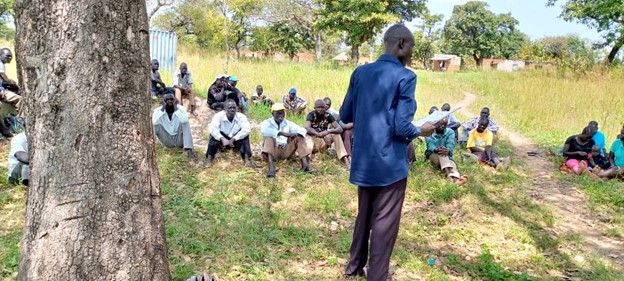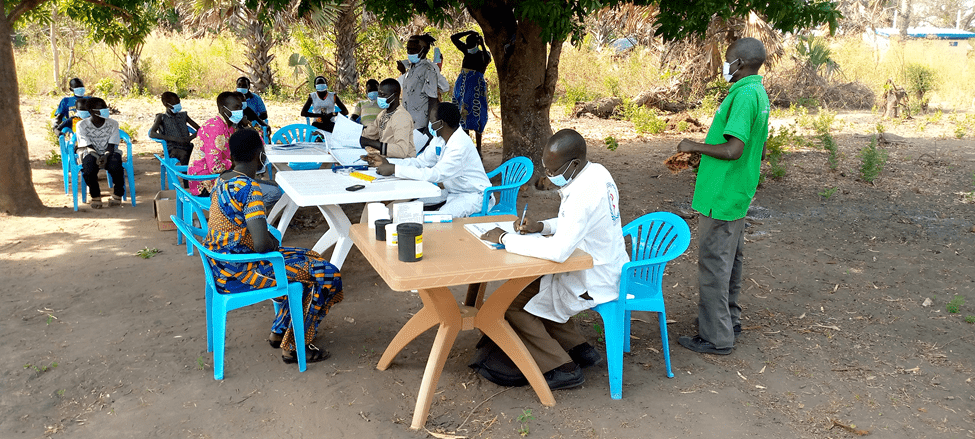 Stories
Stories
March 11, 2021 • 4 min read
Under a tall tree in the village of Abaya in South Sudan community members have been receiving vital healthcare in recent years.
GOAL in South Sudan
A decade of independence in South Sudan has seen civil and internal conflicts. Thousands have been forced to flee their homes, with displacement making access to healthcare extremely difficult.
GOAL has been providing primary health care to more than 4,200 members of the community in Abaya village in Kajokeji County in Central Equatorial state since 2019, with funding from EU Humanitarian Aid. Until now this health care has been delivered under a tree.

Chief Kenyi Moses holding meeting with his community
Kenyi Moses’ story
The programme is reliant on the support and co-operation of community leaders.
One such leader is Kenyi Moses (57), who was forced to flee his home with his family after conflict broke out in 2017.
“We had to run from our homes. We thought about fleeing to a refugee camp in Uganda. After four days of walking, we arrived in Abaya village (near the Ugandan border) and rested for the night.”
The community welcomed Kenyi, offering casava to eat and water to drink.
Chief Kenyi Moses holding meeting with his community on their contribution for setting up the health and voluntary day every Monday held on 23th/April/2020 in Abaya village.
Kenyi was surprised that the villagers of Abaya had decided to stay despite the violence that surrounded them. He asked the community leader why his people had not fled.
A community leader replied: “Life in the refugee camps is very hard and it is difficult to start a new life there. If you decide to stay in Abaya, I can give you land to settle on.”
Kenyi stayed and one year later GOAL arrived in the village to assess the communities needs. Kenyi told GOAL of the struggles that they faced. The community had no access to local healthcare, and had to travel over 6km over the border to Uganda to access healthcare needs.
“Most people, especially children and pregnant women, could not manage walking such a long distance. We had nothing to eat, and we were surviving on one meal a day.”
GOAL began visiting the village every Thursday to provide healthcare for internally displaced people and the host community. The main problem, however, was that there was no building which GOAL could use as a health centre.

The community receiving health treatment under a tree in Abaya village
“It was very hot in the sun, so we showed GOAL a large tree that they could use as their health clinic.”
From August 2019 to early 2020, the clinic under the tree proved a huge success. Many people who had been in hiding felt safe to come to GOAL for help and to have health checks.
Covid-19 in South Sudan
Then 12 months ago a new disease emerged, Covid-19. With prior disease control experience from the Ebola outbreak in West Africa in 2014, GOAL prepared the community for the new virus.
“GOAL hired our sons and daughters as social mobilisers to spread the word about Covid-19, with information how to stay safe. We knew nothing about this disease, but it reminded us of Ebola.”
GOAL’s health staff and social mobilizers travelled from house to house giving information how to prevent the spread of Covid-19 emphasizing the need for social distancing, wearing face masks and regularly washing of hands.
Kenyi’s role as a community leader is to direct, mobilize and ensure that community members participate in Covid-19 awareness. Every Monday, community members gather and practice social distancing and hand washing.
In addition Kenyi got involved in overseeing the upgrading of the current outreach health site under a tree into a dedicated health building. He procured materials and got villagers involved in building rooms to store medicine and provide a space for women to give birth.
“We were able to get iron sheets, nails and timber. We have almost finished all the structures. The next phase is to improve hygiene by adding water and sanitation facilities.”
“Now the community has access to health and nutrition services within an area less than 6 kilometers, Mothers can deliver their babies safely, and children can get vaccinated safely.”
Since 2019, GOAL has carried out health checks with over 4,500 community members. This includes 854 children and 1,700 pregnant and lactating mothers who have had screening for malnutrition.
In addition 120 children have been vaccinated, 46 mothers have received antenatal care and since the outbreak of Covid-19, community leaders have reached 3726 community members with health awareness messages.
“I wish to thank GOAL for the support and also thank ECHO for the funding.” said Kenyi.
